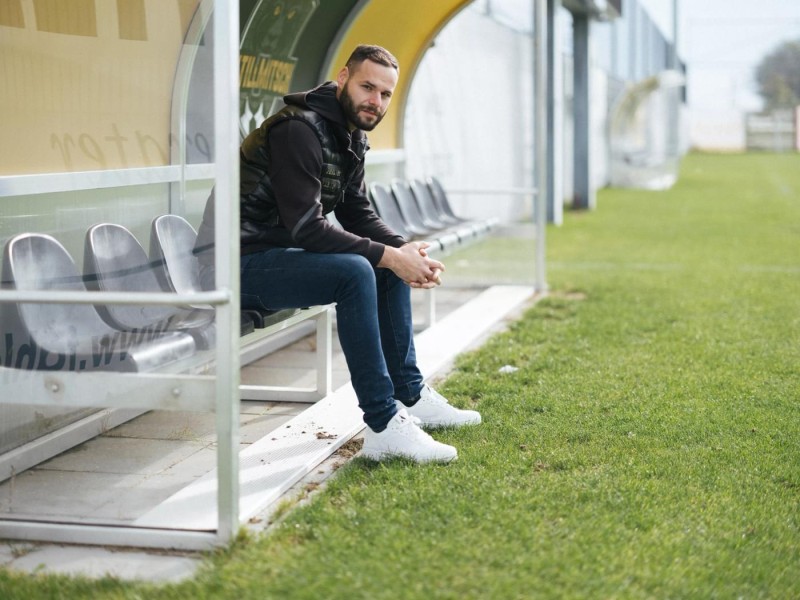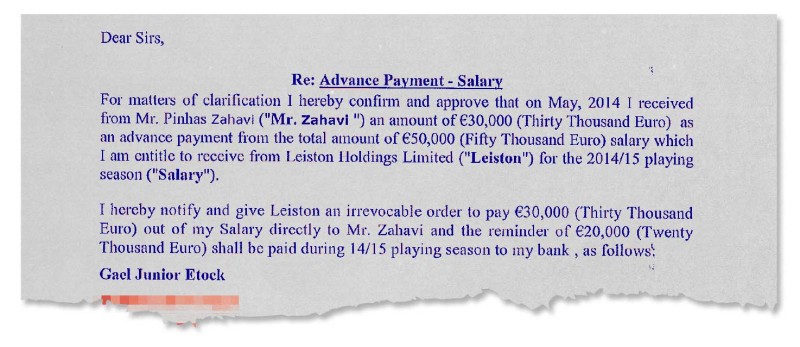Slovenian football player Emir Dautović was once considered one of his country’s brightest prospects. In 2012, at just 16 years of age, he was invited to train with English giants Manchester City. The young defender from the Slovenian team NK Maribor Branik thought he had the world at his feet.
After his try-out in Manchester, he was taken to a meeting with the sporting director of NK Maribor, he told Der Standard and Paper Trail Media, OCCRP’s media partners. Also present were his parents and a representative of the powerful football agent Pinhas “Pini” Zahavi, Dautović said.
Zahavi, who had represented multiple superstar players since the 2000s, had been working closely with Russian billionaire Roman Abramovich, the owner of English Premier League club Chelsea FC. Dautović said Zahavi’s involvement made him dream that he might soon be transferred to Abramovich’s glamorous West London team.
The player’s parents and an NK Maribor director signed a contract presented by Zahavi’s representative. Dautović said he believed the contract was a “big step” because he was told Zahavi could “arrange a transfer to Chelsea overnight.”
Dautović’s father had wanted to think it over, but the sporting director told the family: “You sign now or never,” Dautović said.
"It went like this: sign here, sign there, done. I didn't even take the contract home,” said Dautović. “For me it was like getting onto the motorway in my career… Pini Zahavi would become my agent and that was the best thing that could happen to me.”
But the contract wasn’t with Chelsea, or any other football club. Instead, Dautović’s future had been committed to Leiston Holdings Limited, an obscure company based in the British Virgin Islands and owned by Abramovich. Leiston Holdings agreed to pay NK Maribor 1 million euros for Dautović’s registration.
Dautović’s agreement with Abramovich’s Leiston Holdings was an example of what is known as “third party ownership,” or TPO, whereby a player signs over their “economic rights” to a company. The owner of the rights can dictate where the player plays and how much they earn. The practice was banned by the English Premier League in 2007, and by FIFA at the start of 2015. UEFA General Secretary Gianni Infantino likened TPO to “modern slavery.”
Abramovich owned a stake in multiple players through TPO agreements, media reports in 2020 revealed.
“It went like this: sign here, sign there, done. I didn’t even take the contract home. For me it was like getting onto the motorway in my career.”
Emir Dautović, Slovenian football player, who as a teenager signed a third-party ownership deal with an offshore company belonging to Roman Abramovich.
Now, newly leaked documents give unprecedented insight into the details and scope of Abramovich and Zahavi’s operation as they worked to snap up dozens of players — several under the age of 18 — and profit from their talents by earning money from transfer fees.
OCCRP and its international media partners spoke to three players who signed away their rights to Abramovich’s offshore companies. Only Dautović was willing to be quoted.
The files come from Cypriot corporate service provider MeritServus. The leaked documents were obtained by the pro-transparency group Distributed Denial of Secrets and initially shared with OCCRP and the Guardian. This investigation is part of Cyprus Confidential, a global investigative collaboration led by the International Consortium of Investigative Journalists (ICIJ) and Paper Trail Media.
About the ‘Cyprus Confidential’ Project
Cyprus Confidential is a global investigation examining Russian influence in Cyprus, and how local service providers helped oligarchs and billionaires structure their wealth over the years preceding the 2022 full-scale invasion of Ukraine. The project is based on more than 3.6 million documents leaked from six different Cypriot service providers, as well as a Latvian firm.
Abramovich did not respond to requests for comment. Zahavi declined to comment.
NK Maribor said it could not comment on past player transfers but that the people responsible for “transfer policy, recruitment and sporting matters” at the time Dautović signed with Leiston Holdings had all left the club. The NK Maribor sporting director from that time declined to comment. The alleged representative of Zahavi did not respond to a request for comment.
Unfulfilled Promise
In the 2000s, the well-connected Zahavi was at the center of some of the most expensive player transfers in the world. Zahavi was also widely reported to have helped arrange Abramovich’s acquisition of Chelsea FC in 2003. The leaked records show they continued to work together for years afterwards as Zahavi sought out players for Leiston Holdings.
The so-called “super-agent” has been the subject of multiple media profiles and reports that paint a picture of a well-connected dealmaker who is close to some of the most powerful people in football, including Sir Alex Ferguson, the most successful British manager in history. Zahavi helped make headlines in 2017, when he arranged the world-record 222-million-euro deal that took Brazilian forward Neymar to Paris St Germain from Barcelona.
Zahavi was also reportedly involved in deals to bring superstars to Chelsea after Abramovich bought the club. Thanks to Abramovich’s riches, the long-term underachievers spent unprecedented sums to bring talent to West London, and within two years the club won its first English Premier League championship.
Previous media reports on TPO contracts identified Zahavi’s role with Leiston Holdings, but the new leaked documents reveal further details, including financial details of an arrangement signed by Zahavi and Leiston Holdings.
Under the terms of the 2011 “player investment agreement,” Leiston Holdings would provide 10 million euros to buy the economic rights of players that Zahavi recommended. Zahavi could then share in the profits of future sales of the players’ rights, or earn a commission.
While the Zahavi connection seems to have helped some of the world's top players achieve their dreams, several of those signed up to TPO contracts ended far from the wealth and glamor of the elite European game.
Among the leaked Cyprus Confidential files are scanned letters from the Cameroonian player Gaël Etock, who was a graduate of Barcelona FC’s world-famous academy before signing up with Leiston Holdings in 2011, when he was 18. One of the letters shows that two and a half years after Etock’s TPO contract was signed, Leiston Holdings was paying him just 25,000 euros ($34,000) per season.
The letters show that in January 2014, while he was playing for Cercle Brugge in Belgium, Etock asked Zahavi for a 5,000-euro ($7,000) advance on his salary. Etock asked for another advance of 30,000 euros ($40,000) four months later, by which time his pay had increased to 50,000 euros per season.
Etock was not willing to comment on his arrangements with Leiston Holdings, Abramovich, and Zahavi.
Potential Rule Breaches
Leaked documents suggest Abramovich’s TPO arrangements may have breached FIFA’s rules in two cases.
When FIFA outlawed TPO deals in 2015, it allowed pre-existing contracts to remain in place until expiration or transfer to a new club. A transfer would require a new contract between that club and the player, which would replace the TPO arrangement.
Since new TPO contracts were banned, this effectively meant third-party owners of player rights could sell them only once after 2015.
However, balance sheets for Abramovich’s companies show they continued to list two players as assets despite those players moving between clubs multiple times after the ban came into effect. Experts said this indicates possible violations of FIFA’s TPO ban.
André Carrillo, a Peruvian attacking midfielder, and Brazilian Armindo Tue Na Bangna, known as Bruma, were found among 25 players named in a list of “intangible assets” on 2019 balance sheets for Leiston Holdings and another Abramovich company called Conibair Holdings Ltd. Both men had been transferred multiple times between the 2015 ban and the period covered by the balance sheets.
Samuel Cuthbert, a sports law barrister with London-based Outer Temple Chambers, told OCCRP that since transfers between parties should require new contracts, Carrillo’s status as a Leiston Holdings asset after multiple transfers “may well be … a breach of the [TPO] ban.”
The same goes for Bruma, sports law expert Antoine Duval told OCCRP’s partner Der Spiegel. Duval said it was impossible to judge whether the TPO ban had been violated without seeing the underlying contracts and transfer documents, but that the leaked balance sheets indicated a breach of the rules may have taken place.
“It seems difficult to envisage a situation in which a player is still legally the object of a TPO investment after having been transferred twice after the entry into force of the ban,” he said. “Once [Bruma] is transferred to a new club, a new TPO agreement would need to be signed between Conibair and the new club, which would be agreed after the entry into force of the ban.”
Carrillo and Bruma did not respond to messages sent to their social media accounts. Two of the clubs that loaned or purchased Carrillo or Bruma told reporters they were given written assurances by the players and other football clubs involved that no TPO contracts were in force. Abramovich did not respond to questions and Zahavi declined to comment.
Critics of TPO arrangements have raised the possibility of conflicts of interest, and a BBC report from 2020 revealed that Carrillo had played for Portuguese team Sporting Lisbon against Chelsea in the 2014 UEFA Champions League, when Abramovich owned half of Carrillo’s economic rights.
Carillo also played for Watford against Chelsea in the Premier League in October 2017, when he was seemingly still considered an asset of one of Abramovich’s firms. There is no suggestion that Abramovich’s ownership stake in Carrillo’s rights impacted his performance or the outcome of the games.
‘Sole Discretion’
Leaked documents also show that the Abramovich firm Leiston Holdings had contractual rights to influence player transfer decisions in some cases, which might have breached FIFA’s longer-standing rules against “third party influence,” or TPI. These rules, introduced in 2008, prohibit outside companies or individuals from exerting control over football clubs’ “employment or transfer-related matters.”
In at least three cases, contracts show that Abramovich’s company had “sole discretion” over the transfer of players. Sports barrister Cuthbert described the clauses as “troubling,” saying it was “difficult to reconcile a third party appearing to have total control over the transfer of a player” with FIFA’s ban on TPI.
Duval said such “sole discretion” clauses were “typically contrary to FIFA’s ban on third-party influence.”
As well as these clauses, a 2011 agreement between Leiston Holdings and Sporting Lisbon over Carrillo’s rights stipulated that the club must accept any transfer offer in excess of $6 million, or pay Leiston Holdings 45 percent of the offered amount if the club wished to reject it. (In this scenario, the club would also gain full control of Carrillo’s player registration.)
Leiston Holdings also sent a January 2012 letter to Club Deportivo Cuenca in Ecuador informing the team that its player John Narváez would be transferred to another club during that month’s transfer window, under the terms of a prior “Purchase Agreement.”
Duval said the letter to Club Deportivo Cuenca lacked context since the prior purchase agreement was not among the leaked documents, but added that the letter’s “tone points to a case of third-party influence under the FIFA [rules].”
‘I Worked For Abramovich?’
Back in Slovenia in 2012, Emir Dautović believed he had signed an agreement for Zahavi to be his representative, setting him on a path to stardom, but that he was still registered as a player for NK Maribor. In reality, his registration now belonged to Leiston Holdings, which had the right to decide where Dautović would play.
“Never heard of [Leiston Holdings]. Who is behind it?” Dautović asked when OCCRP’s international media partners named the company. Nor did he know Abramovich owned the firm, and therefore his economic rights.
“I worked for Abramovich? I'm taken aback by that. I swear, I didn't know that,” he said when reporters told him the full details of the arrangement.
Soon Dautović was on the move, but not to the star-studded Premier League or another of Europe’s major football competitions. Instead, he was transferred to OFK Beograd in Belgrade, Serbia. He had no say in the transfer, he told reporters.
Soon after he was transferred again, this time to the Belgian team Royal Excel Mouscron. Again, he was not consulted on the deal, he said.
“I was having coffee with my best friend when my agent rang me and said: 'The day after tomorrow you're flying to Belgium, we've arranged everything already.’”
Dautović told reporters he had a difficult time in Belgium, failing to secure a regular spot in the Mouscron team. He was 19 years old and miserable, and ultimately decided to pay for his ticket back home to Slovenia and his family.
Dautović’s career never took off. Partly he blames an injury he sustained in 2012. But he also feels he was not given a fair shot with Zahavi, who never even came to meet him.
“I have never met Pini in my entire life,” Dautović said.
“Do I think I was used? Yes. You are a commodity.”







